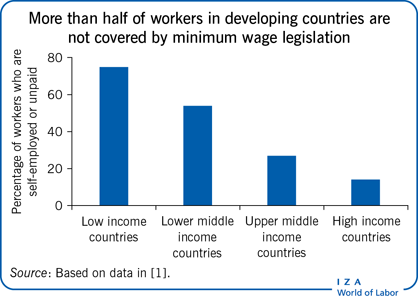Elevator pitch
Raising the minimum wage in developing countries could increase or decrease poverty, depending on labor market characteristics. Minimum wages target formal sector workers—a minority in most developing countries—many of whom do not live in poor households. Whether raising minimum wages reduces poverty depends not only on whether formal sector workers lose jobs as a result, but also on whether low-wage workers live in poor households, how widely minimum wages are enforced, how minimum wages affect informal workers, and whether social safety nets are in place.

Key findings
Pros
If job losses in the formal sector are small, raising the minimum wage is likely to reduce poverty.
If informal sector wages rise when the minimum wage increases, higher minimum wages are likely to reduce poverty.
If the people earning the minimum wage are heads of low-income households, higher minimum wages are likely to reduce poverty.
If low-income workers lose jobs and cannot find new jobs because of a higher minimum wage, social safety nets for low-income households can protect against increased poverty.
Cons
If higher minimum wages cause workers to lose formal sector jobs, they are not likely to reduce poverty.
If minimum wage legislation does not cover a large pool of informal workers, higher minimum wages are not likely to reduce poverty.
If the workers affected by the minimum wage are secondary family workers live in non-poor households, higher minimum wages will not reduce poverty.
If low-income workers lose jobs and cannot find new ones because of higher minimum wages and there are no social safety nets, higher minimum wages will increase poverty.